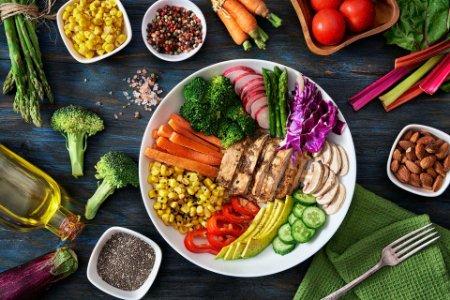
An appropriate diet can help reduce the intensity and frequency of migraine attacks.
Anti-Migraine Diet: What Foods Should We Eat and What Foods Should We Avoid?
Almost everyone gets headaches occasionally. However, for people with migraines, the pain can be much more intense and accompanied by other symptoms. It is estimated that around 1.1 billion people experience migraine attacks, making migraines the second leading cause of disability worldwide.
Recent research shows that food and diet may play a role in managing migraines. Changes in your diet may help prevent migraines or reduce their frequency. To learn more about how this approach works and what foods to eat or avoid, continue reading.

Foods rich in magnesium are helpful for reducing migraines.
Foods and drinks beneficial for migraines
Some foods are high in minerals, vitamins, and fatty acids that can help prevent migraine attacks. Certain drinks may also alleviate symptoms or prevent migraine triggers.
Magnesium-rich foods
Research in 2021 discovered a connection between migraine frequency and American adults aged 20 to 50 who did not receive enough magnesium in their diet. Other research in 2021, primarily involving white women, suggests that magnesium may provide migraine relief.
Magnesium-rich foods include:
• Dark leafy greens
• Avocado
• Tuna
• Banana
• Dark chocolate is also rich in magnesium, but there are some debates about whether its other components may trigger migraine attacks. A 2020 review found insufficient evidence to confirm this, but everyone’s experience is different.
Omega-3 fatty acids
Research suggests that increasing omega-3 fatty acids may help those with migraines. Omega-3 rich foods include:
• Fish such as salmon and trout
• Seeds
• Legumes
Foods rich in fiber
A study in 2022 found that increased dietary fiber was associated with a reduction in the frequency of severe headaches or migraine attacks. The authors of the study emphasized the need for further research before making global dietary recommendations, but the potential role of dietary fiber is significant.
Foods high in fiber include:
• Whole grains
• Fruits
• Vegetables
• Potatoes
• Beans
Water
Staying hydrated can help prevent migraines and reduce symptoms because dehydration can be a migraine trigger. A study involving 256 women aged 45 and under found that drinking more water daily reduced the intensity and frequency of migraine headaches. Some teas may also provide additional benefits, such as reducing nausea or headache symptoms.
Whole foods
Avoiding processed foods in favor of whole and unprocessed foods is generally a good recommendation for everyone. Whole and unprocessed foods include fruits, vegetables, grains, legumes, and nuts and seeds. However, completely avoiding processed foods can be challenging. If you find that additives like artificial flavors, sweeteners, or preservatives trigger your migraines, try to avoid them in most of your diet.

Drinking enough water helps keep the body hydrated and reduces headaches.
Foods that may trigger migraines
Food and chemicals found in it can potentially trigger migraine attacks. Currently, there is no definitive list of foods or drinks that cause or do not cause migraine attacks. Migraine triggers and food sensitivities may vary from person to person. However, many individuals anecdotal claim that certain foods and drinks trigger their migraines. Some of the foods and drinks mentioned in research include:
• Foods rich in nitrates, such as processed meats and hot dogs
• Monosodium glutamate (MSG), an additive often found in processed foods
• Artificial sweeteners, particularly aspartame and sucralose
• Tyramine, a chemical found in fermented foods, aged cheeses, and some types of freshly baked bread
• Phenylethylamine, an amino acid found in chocolate, nuts, citrus fruits, soy products, and vinegar
• Alcoholic beverages like wine and beer
• Dairy products and ice cream
• Caffeinated drinks like coffee
• Certain vegetables, including tomatoes and onions
• Foods containing histamine, including alcohol, fermented foods, dried fruits, and more
• Gluten, a protein found in wheat
Some studies suggest that the foods themselves may not be the actual problem. Instead, food cravings and hunger may be the real triggers.
More research is needed to understand whether hunger, food, or a combination of these causes migraines.
The relationship between caffeine and migraines
Caffeine presents a complex issue regarding migraines. Some individuals view it as a trigger. However, caffeine may also help, at least in limited amounts. Caffeine is an active ingredient in several headache medications, including Excedrin, Midol, Darvon Compound, and Migranal.
Research shows that caffeine may provide relief in acute situations. But proceed with caution, as daily caffeine consumption may lessen its beneficial effects. For the best advice, discuss caffeine intake with your doctor.

A balanced and diverse diet helps maintain overall health and reduce migraines.
How to identify migraine-triggering foods?
Some individuals with migraines keep a journal to track the foods they eat and when migraine attacks occur. Some apps can also help you do this. A migraine attack may happen a few minutes to several hours after consuming a specific food. A journal can help you identify patterns regarding when attacks follow eating specific foods.
If you identify a potential triggering food or drink, try to eliminate it from your diet to see if migraine attacks continue. If you notice an improvement in your symptoms, that food may be a trigger.
Is there a specific diet that can help migraines?
There is no one-size-fits-all diet that is best for migraine sufferers. However, research indicates that various dietary approaches may help reduce migraine attack frequency. Examples include:
• Ketogenic diet (keto)
• Modified Atkins diet
• Diets high in folate
• Low-fat diets
• Diets high in omega-3 and low in omega-6
• Low glycemic index diets
• Low sodium diets in older adults
Keto and modified Atkins diets may help reduce migraine attacks compared to a standard diet.
Ketosis, the process of fueling the brain with ketones instead of glucose (sugar), may be responsible for this protective effect. These diets involve eating low-carbohydrate, high-fat foods such as seafood, non-starchy vegetables, and eggs.
However, be cautious: some keto-friendly foods may trigger migraines. Always consult with a physician or a nutritionist before starting a keto diet, as there are risks involved.
Keto diets may not be suitable for individuals concerned about their heart health. However, heart-healthy diets like Mediterranean and DASH may also help reduce migraine symptoms.
There is also increasing evidence that plant-based diets, such as vegetarian diets, may help with migraines. A 2023 study found a link between plant-based diets and a reduction in the frequency of migraine headaches. However, more research is needed.
No matter which diet you choose, it’s essential to ensure you consume enough calories to meet your daily energy needs. Some diets, including many of those mentioned above, can often be quite restrictive and may prevent you from getting adequate nutrition. Be sure to discuss a suitable dietary plan with your doctor.

A personalized diet may yield the best results for managing migraines.
Frequently Asked Questions About Diet for Managing Migraines
1. Is the ketogenic diet beneficial for migraines?
The ketogenic diet has been effective for some individuals suffering from migraines. This diet works by lowering blood sugar and increasing ketones in the body. However, be sure to consult your doctor before starting any new diet.
2. How long does it take for dietary changes to impact migraines?
The time required to see results varies and depends on the individual and the type of diet. It may take several weeks to several months to see significant changes.
3. Is a specific diet appropriate for all individuals with migraines?
No, each person is different and may respond to different diets. The best way to find a suitable diet is to consult a nutritionist.
4. Are migraines linked to other diseases?
Yes, migraines can be associated with other conditions such as depression, anxiety, fibromyalgia, and cardiovascular diseases. Additionally, women with migraines are at a higher risk of stroke.
5. Can migraines affect daily functioning?
Yes, migraines can significantly impact quality of life, work performance, and social relationships.
6. Are migraines curable?
Currently, there is no definitive cure for migraines, but medications and lifestyle changes can significantly help reduce the intensity and frequency of attacks.
7. Can migraine occurrences be prevented?
While it is not possible to completely prevent migraine occurrences, identifying and avoiding triggers and maintaining a healthy lifestyle can help reduce the number and intensity of attacks.
Summary
Treatment and prevention of migraine attacks often involve medications or other therapies to reduce the frequency and severity of attacks. However, dietary changes may also contribute significantly. Some dietary patterns, such as keto and plant-based diets, may help prevent migraine attacks. Healthy eating behaviors, like choosing unprocessed foods and drinking plenty of water, can also be beneficial.
If you think specific foods or drinks may be contributing to your migraine attacks, keeping a journal to track what may trigger them can be helpful. Share it with a doctor to work together on a more personalized treatment plan.
Compiled by:SelMagz Health Section
Nutrition and Fitness







